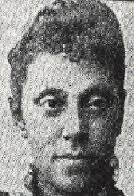 Gertrude Emily Hicks Bustill Mossell was an African-American author, journalist, and teacher. The daughter of Charles and Emily Bustill, she came from a prominent family. Her great-grandfather, Cyrus Bustill, served in George Washington’s troops as a baker and after the War of Independence, he started a successful bakery in Philadelphia. In 1787, alongside Richard Allen, he founded the Free African Society, the first black mutual-aid society in America. Among the many other Bustills of distinction are Gertrude’s great-aunt, abolitionist and educator Grace Bustill Douglass and her daughter Sarah Mapps Douglass, who followed in her mother’s footsteps. Gertrude’s sister, Maria Louisa Bustill (1853-1904), married William Drew Robeson I (1845-1918); they were the parents of Paul Robeson.
Gertrude Emily Hicks Bustill Mossell was an African-American author, journalist, and teacher. The daughter of Charles and Emily Bustill, she came from a prominent family. Her great-grandfather, Cyrus Bustill, served in George Washington’s troops as a baker and after the War of Independence, he started a successful bakery in Philadelphia. In 1787, alongside Richard Allen, he founded the Free African Society, the first black mutual-aid society in America. Among the many other Bustills of distinction are Gertrude’s great-aunt, abolitionist and educator Grace Bustill Douglass and her daughter Sarah Mapps Douglass, who followed in her mother’s footsteps. Gertrude’s sister, Maria Louisa Bustill (1853-1904), married William Drew Robeson I (1845-1918); they were the parents of Paul Robeson.
Gertrude Bustill was born in Philadelphia, Pennsylvania on July 3, 1855. She attended public schools in Philadelphia, Pennsylvania at the Institute for Colored Youth and the Robert Vaux Grammar School. She delivered a graduation speech entitled “Influence,” which impressed Bishop Henry McNeal Turner, editor of the African Methodist Episcopal newspaper, The Christian Recorder. Bishop Henry McNeal published “Influence” and invited Bustill to contribute poetry and essays to the newspaper.
During the 1870’s Bustill taught for seven years at public schools in New Jersey, Pennsylvania, and Kentucky. However, it was as a journalist, that Gertrude Bustill distinguished herself. This was at a time when women journalists were extremely rare. Bustill was a contributor to the Philadelphia Press, Philadelphia Independent and Philadelphia Echo on issues related to African American women. Eventually she wrote a column in T. Thomas Fortune’s New York Age, “Our Women’s Department,” which ran from 1885 until 1887. Her articles featured discussions as specific as the right way to nurse sick children, paralleling those in popular whyte home journals; and on a black woman’s responsibilities to her community. Her articles inspired her most successful publication, The Work of the Afro-American Woman, in 1894, a survey of the century’s Black female leaders, from poet Francis Harper to scholar Anna Cooper. Bustill also contributed to the Indianapolis World as well as the A.M.E. Church Review.
Bustill married Nathan F. Mossell, the first African American to receive a medical license from the University of Pennsylvania, in the early 1880s. With his credentials and her connections, the two spearheaded Philadelphia’s Black hospital movement in 1895, establishing Frederick Douglass Memorial Hospital, at 1512 Lombard St., the second private Black hospital in the nation. In addition to leading the ladies’ auxiliary, for which she raised more than $30,000, she contributed through her writings. Her poem I Am Calling to You served as an advertisement for the hospital. Her other works covered a range of styles and topics, from the poem Emancipation to a children’s book, Little Dansie’s One Day at Sabbath School. In 1913, Bustill’s poem “Dear Old Philadelphia” was published as an ad by “Seeing Philadelphia” Automobiles.
The streets may be the narrowest
In dear Old Philadelphia,
But still your course is straightest
In dear Old Philadelphia.
– Gertrude Bustill’s “Dear Old Philadelphia”
In 1948, at the age of 92, Gertrude E.H. Bustill Mossell died in the Frederick Douglass Memorial Hospital in Pennsylvania.
As a member of one of the most elite 19th-century African American families, and as both a prolific journalist and social activist, Gertrude was memorialized in an obituary printed in countless American newspapers, including the Philadelphia Tribune and the New York Times.
Sources:
http://articles.philly.com/2013-01-28/news/36579079_1_articles-cyrus-bustill-black-female-leaders
http://www.blackpast.org/aah-mossell-gertrude-e-h-bustill-1855-1948#sthash.RTQxQrR0.dpuf
https://en.wikipedia.org/wiki/Gertrude_Bustill_Mossell


